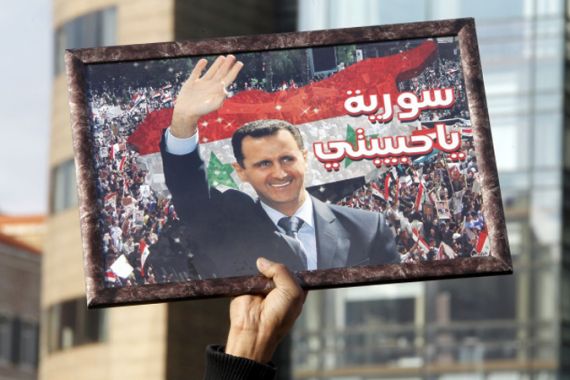Assad offers ‘amnesty’ for opposition
Decree calls for “fugitives” to give themselves up, as UN chief Ban Ki-moon urges Syrian president to stop the violence.

| Syrian fighters have regrouped in Lebanon to plan raids on Syrian government checkpoints [Al Jazeera] |
Syrian President Bashar al-Assad has offered amnesty to anyone accused of alleged crimes in connection with the last 10 months of anti-government unrest and resulting violence.
Assad has made similar decrees on three previous occasions in May, June and November. Sunday’s announcement was made on the official SANA news agency and broadcast on state television.
Since the outbreak of the uprising against Assad’s rule in March, Assad has freed 3,952 prisoners, according to SANA. The opposition claims there are thousands more in Syrian prisons and said that 26 people had died on Sunday, including a policeman and soldier killed by security forces for refusing to fire on protesters.
The new amnesty decree was granted “for crimes committed in the context of the events taking place since March 15, 2011, till the date of issuing the decree”, SANA reported.
It encompasses those who have peacefully demonstrated, evaded Syria’s military draft or carried unlicensed weapons and ammunition. But the “fugitives” covered by the decree must turn themselves in to authorities by January 31, SANA said.
The United Nations estimates at least 5,000 people have been killed since initially peaceful protests against Assad’s government were met by a brutal security crackdown, sparking an ongoing armed conflict in which both the military and the opposition, which includes army defectors, have conducted attacks.
Assad heading for ‘dead end’
Meanwhile on Sunday, the secretary-general of the United Nations called on Assad to end the crackdown against anti-government protesters.
“Today, I say again to President Assad of Syria: Stop the violence. Stop killing your people. The path of repression is a dead end,” Ban Ki-moon said in a keynote address at a conference on Arab world democracy in the Lebanese capital, Beirut.
Ban also said that the revolutions in the Arab world showed that people would no longer accept tyranny.
“The lessons of the past year are eloquent and clear. The winds of change will not cease to blow. The flame ignited in Tunisia will not be dimmed. Let us remember as well, none of these great changes began with a call for a regime change. First and foremost, people wanted dignity,” he said.
Ban also discussed the crisis in Syria with Ahmet Davutoglu, the Turkish foreign minister, in the Lebanese capital on Saturday, a spokesman for Ban said.
“They discussed a range of regional matters, in particular the situation in Syria as well as Iran and Cyprus,” said Martin Nesirky. “The secretary-general said the dangerous trajectory of the crisis in Syria was a source of grave concern.”
Turkey shares a 910km border with Syria, its former ally, and has strongly condemned the Syrian government’s crackdown on dissent.
Call for dialogue
The statements from Ban came as Hassan Nasrallah, the leader of Lebanon’s Hezbollah, called on the Syrian opposition to respond positively to President Bashar al-Assad’s “reform plans” and urged dialogue to resolve the ongoing crisis.
Addressing a party rally in the town of Baalbek by video link, Nasrallah, who has been in hiding since 2006 for fear of assassination, said: “We call on the Syrian opposition inside and outside Syria to respond to the calls of the dialogue by President Assad and to co-operate with him in implementing the reforms he has announced, which are very important reforms.
“We can resolve Syria’s problems and we call openly for the return of calm and stability and for arms to be laid down and for resolving issues through dialogue.”
Nasrallah called on Arab countries, Turkey and Iran to participate in resolving the crisis in Syria.
“We call for the unification of efforts by the Arab countries and the Arab League and the influential Muslim countries in the region, Iran and Turkey, to help end the crisis in Syria and not drive people into corners and drive the situation towards an explosion,” Nasrallah said.
He also dismissed a UN call for his staunchly anti-Western and anti-Israeli group to disarm, saying it was determined to maintain a military capacity to defend Lebanon.